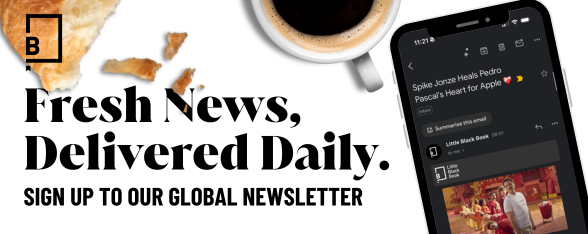
Awesome Sauce: How Heinz Ketchup Is Satisfying Brazilians’ Hunger for Tasty, Authentic Creative

Who says authenticity and purpose have to be boring? The ever-iconic brand Heinz Ketchup has been putting out a juicy flow of creative work and playful activations in Brazil that has been a tasty mix of earnest and entertaining.
It’s all part of Heinz Ketchup’s ‘Primeiro Tomate’ - or tomato-first - strategy that seeks to underline the fact that the iconic ketchup is made using just six natural ingredients. That campaign was launched this year. As a complement to the campaign, the brand started selling bottles with a ‘plantable label’ - seeds embedded in the label allow people to grow their very own Heinz tomatoes.
Luana Sá is brand building manager at Kraft Heinz and she said the idea - which was developed during a joint brainstorming session with their agency Agencia Africa - is deliberately irreverent. However it taps into something more serious - Brazilians’ increasing interest in the provenance of their food, and how healthy it is.

“Yes, this is an increasingly present theme in discussions, social networks and press reports, and something that more demanding consumers want to know,” says Luana, who adds that Heinz Ketchup has been somewhat ahead of the curve on this, as it has been communicating around the fact that the ketchup is made with six ingredients since 2018 (according to Heinz, the acidity of the sauce makes it unfavourable to microbes and therefore negates the need for preservatives). This new ‘Primeiro Tomate’ strategy simply focuses on the star ingredient.
“An interesting point to emphasize is the intrinsic naturalness of Heinz Ketchup, which is composed of the “tomato first” plus five natural ingredients, as highlighted in our campaign,” says Luana. “The Heinz tomato is redder, fuller and tastier than the tomatoes that are found on the market, in addition to being the main ingredient in our ketchup. The campaign reinforces the quality and superiority of Heinz Ketchup and emphasizes that the tomato – and the entire painstaking process surrounding it – comes first.”
This hunger for transparency and authenticity has been driven by younger people, who have also shaped the way that Heinz Ketchup communicates with their audience. Luana also says that while purpose is important, these exacting taste-makers won’t stand for anything that whiffs of opportunism.
“The consumer is more attentive, does not like opportunism, seeks truth, social responsibility, and seeks brands that understand that the moment is challenging and the future will be even more so and that they can help make the world a better place,” says Luana. “Consumers also want brands willing to look inside, in order to start the change and understand their purpose. That starts with their employees, who understand that the purpose is not just to be shown to the public, but to be part of every decision made by executives. Brands that are present in contemporary conversations understanding that their role is fundamental to change.”

It seems that the combination, then of simplicity, fun and honesty has struck a chord. The Plantable Label doesn’t over-promise or engage in overwrought operatics - it goes straight to the point and gives people the chance to get hands on and see the truth for themselves.
It’s an approach that has been a winning formula for Heinz Ketchup for some time, even before the ‘Primeiro Tomate’ campaign. “Brazilians expect unusual actions from the Heinz brand and we had numerous successful communication cases,” says Luana.
In 2018, the team created the biggest Heinz label in history - a label that could be seen from space and was so big that it entered Guinness World Records. The idea was that the brand was so proud of using only six ingredients that it didn’t need to hide behind the ‘small print’ - and so they created a 4,500 square metre label, weighing 3.4 tonnes and visible at a 695 km height.
Then, they decided to turn the silliness up a notch or two - because as important as wholesome ingredients are, the product still needs to get taste buds tingling. For Bacon Day 2019 the installed bacon-scented street furniture in São Paulo, a sensory activation that invited people to the Bacon Day Festival and connected with the bacon and caramelized onion flavoured ketchup launched the previous year.

To celebrate the brand's 150th anniversary in 2019, they decided to get classy by launching ketchup caviar, which was reported on by foodie blogs around the world Heinz. In a witty twist, only 150 units arrived in Brazil and the team held an exclusive experience in partnership with the Esther Rooftop restaurant, in São Paulo, to provide a unique gastronomic experience for the brand's fans.
However, when circumstances call for the brand to get more serious, the team has risen to the occasion. At the beginning of the pandemic, the brand created the Heinz Basket composed of the six ingredients that are used to make the ketchup. These boxes were distributed to an association that then used the products to cook meals for socially vulnerable people.

Overall, whether earnestly espousing the product’s natural ingredients or having fun with the Brazilian public, the brand has been very deliberately keyed into contemporary Brazilian culture and conversation.
“Heinz positions itself as a cool brand, hacking contemporary and very current conversations to generate connection with its target audience,” explains Luana. “With a consumer profile that explores new experiences and new flavours, the brand brings boldness and confidence in its communication, with relevant, agile and often provocative actions to draw the consumer's attention. Always bringing consistency and the message that Heinz ketchup is made with six 100% natural ingredients, reinforcing the brand's quality and superiority over the competition. Heinz is an iconic brand, which has numerous Brazilian fans and brand lovers, and which sees the country as an important pillar of growth for the brand.”
In order to be responsive and agile and to really understand what’s going on in the market, the team at Heinz Ketchup (and parent company Kraft Heinz) has been busy ensuring that it’s approach to data is as sharp as its creative.
“Our premise is to place the consumer at the center of their strategic decisions, whether in their products or in their actions. It is essential to always keep in mind that all product launches, marketing actions and campaigns are made for real people, for consumers with needs that also change according to the context,” explains Luana.
That has been particularly helpful when it comes to navigating the shocks and waves of the Covid-19 pandemic. Understanding the consumer journey and tapping into data has helped the marketers at Kraft Heinz behave more empathetically and better fulfill people’s needs, says Luana. “In times of crisis, consumers look for trusted brands that have empathy. We live in a period in which things change month by month, week by week, and in the future that has arrived, brands must remain in tune with external conversations. In this scenario, the classic concepts of Business to Business (B2B) and Business to Consumer (B2C) lose strength and give way to Human to Human marketing, with more humanized actions and companies that are made by people and for people.”
At Kraft Heinz Brasil the insights area has been helping the marketers optimise their ecommerce and media efforts and they are even going further. The team is implementing free internet, the Heinz Wi-Fi service, in order to develop their own proprietary data to better understand consumers.
What the team at Heinz Ketchup in Brazil - and their agency Agencia Africa - have been able to do is translate the global goals and brand ideas into the lively local context. Data has certainly helped, but ultimately they’ve had the confidence to get creative and be playful with ideas that are as beautifully simple as the six ingredients in the sauce.















